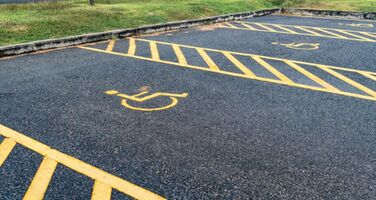
Handicap Placard vs. Handicap License Plates: Which is Right for You in Iowa?
Introduction
When it comes to mobility and accessibility, individuals with disabilities in Iowa have options to make their lives easier. Two common solutions are the placard and license plates. Both options provide certain privileges and benefits to people with disabilities. However, it's important to understand the differences between the two and determine which one is right for you. In this article, we will explore the distinctions, requirements, and advantages of both handicap placards and handicap license plates in Iowa.
Handicap Placard: A Convenient Solution
What is a Handicap Placard?
A handicap placard is a special identification card that is displayed on the rearview mirror of a vehicle, indicating that the driver or passenger has a disability. It allows individuals to park in designated parking spaces and provides certain parking privileges.
How to Obtain a Handicap Placard?
To obtain a handicap permit in Iowa, you need to follow a straightforward process. You will need to complete an application form, provide medical documentation from a licensed healthcare professional, and submit the required fee. Once approved, you will receive a placard that should be displayed whenever you park in designated parking spaces.
Benefits of a Handicap Placard
Having a handicap placard offers several benefits. These include:
Accessible Parking: With a permit, you can park in designated parking spaces that are closer to building entrances, ensuring easier access.
Convenience: It allows you to park in designated spaces without the need to search for regular parking spots, saving time and energy.
Mobility: Individuals with mobility impairments can reduce the distance they need to walk from the parking area to their destination, making it easier to navigate and reducing the risk of injuries.
Flexibility: It can be used in any vehicle in which the holder is traveling, providing convenience and flexibility.
Things to Consider with a Handicap Placard
While a permit offers convenience, there are a few important considerations:
Expiration Date: Placards have an expiration date, and you must renew them before they expire to continue enjoying the benefits.
Misuse: Misusing a permit is illegal and can result in fines or penalties. It is important to use the permit only when the person with the disability is present in the vehicle.
Handicap License Plates: A Permanent Solution
What are License Plates?
License plates are special vehicle registration plates issued to individuals with disabilities. These plates are affixed to the vehicle and provide the same benefits and privileges as disability passes.
How to Obtain License Plates?
To obtain license plates in Iowa, you will need to complete an application form, provide medical documentation, and pay the necessary fees. The application process is similar to that of a disability pass, but instead of receiving a pass, you will be issued a set of license plates with the handicap symbol.
Advantages of License Plates
Opting for license plates offers several advantages:
Permanent Attachment: License plates are permanently attached to the vehicle, eliminating the need to hang a pass on the rearview mirror each time you park.
Visibility: License plates are easily visible to parking enforcement officers, reducing the chances of receiving parking violations.
Flexibility: License plates can be used on any vehicle registered in the name of the person with the disability, allowing for more flexibility in transportation options.
Things to Consider with License Plates
While disability license plates provide a more permanent solution, there are a few factors to keep in mind:
Vehicle Ownership: License plates are tied to the vehicle, so if you frequently change vehicles or borrow cars, a pass may be a more suitable choice.
Transferability: License plates are not transferable between individuals, so if you need to transfer the benefits to another vehicle owner, a disability pass would be a better option.
Additional Documentation: When using license plates, it is important to carry the registration certificate, proving that you are the authorized holder of the plates.
FAQs
FAQ 1: How long is a disability pass valid in Iowa?
Answer: Iowa handicap placards are typically valid for five years. You must renew before it expires to continue enjoying the benefits.
FAQ 2: Can I use a disability pass or license plate in other states?
Answer: Yes, they are recognized across the United States. However, it's important to familiarize yourself with the specific rules and regulations of each state you plan to visit.
FAQ 3: Can I lend my disability pass or license plate to someone else?
Answer: No, they are issued to individuals and are non-transferable. Lending your placard or plates to someone else is illegal and can result in penalties.
FAQ 4: Can I apply for both a disability pass and disability license plates?
Answer: Yes, it is possible to have both. However, you can only use one or the other at a given time.
FAQ 5: Can I use a disability pass or license plate if I am not the driver?
Answer: Yes, they can be used when you are a passenger in a vehicle. The parking benefits extend to both drivers and passengers with disabilities.
FAQ 6: Are there any fees associated with obtaining a disability pass or license plate?
Answer: Yes, there are fees associated with obtaining a disability placard or license plate in Iowa. The fees help support programs and initiatives for individuals with disabilities.
Conclusion
When deciding between a handicap placard and handicap license plates in Iowa, it is crucial to consider your personal needs and preferences. Both options provide valuable benefits, including accessible parking and increased mobility. Disability permits offer convenience and flexibility, while license plates provide a more permanent solution. By understanding the distinctions between these two options, you can make an informed decision that best suits your circumstances. Remember to follow the guidelines and requirements set by the state of Iowa to ensure you can take full advantage of the privileges offered by either a permit or license plates.
.png)






